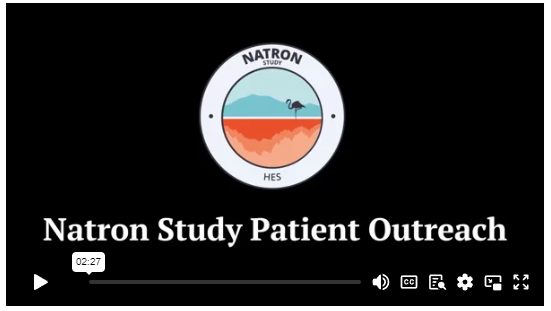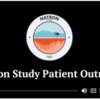Welcome to our November research update! Getting involved with research is an important way to impact asthma and allergy treatments, education, and awareness.
This month, we are highlighting clinical trials, interviews, focus groups, and news on:
- Asthma
- Hypereosinophilic syndrome (HES)
- Sesame labeling
- CSU
- Research updates from the 2023 American College of Allergy, Asthma and Immunology (ACAAI) Annual Scientific Meeting
Asthma and Allergy Clinical Trials
NATRON Study for Hypereosinophilic Syndrome (HES) Is Seeking Eligible Participants
View message from Dr. Princess Ogbogu, MD, by clicking on the image and scrolling down to the video.
Do you or your child have Hypereosinophilic Syndrome (HES)? The NATRON study is now enrolling patients 12 and older.
Those who qualify may receive:
- Study-related care from local doctors at no cost
- Study medication at no cost
- Reimbursement for reasonable trial-related travel expenses
There is no obligation, so answer a few questions now to see if you or your child may qualify to participate. Click below and follow the link.
Are You Currently Taking Oral Corticosteroids (OCS) for Your Asthma?
Would you like to contribute to important new research? SUNRISE is a clinical study investigating whether a new biologic treatment called tezepelumab may help to reduce or remove the need for OCS in adults with severe asthma. The study is looking for people who:
- Are between 18 and 80 years of age
- Have had an asthma diagnosis for at least 1 year
- Have been taking OCS for asthma for at least 6 months
- Have been using inhaled corticosteroids for at least a year, and a long-acting beta 2-agonist (LABA) for at least 3 months
- Have not been receiving any biologic treatment for asthma for at least 4 months
Sponsored by AstraZeneca
Now Accepting Patients for National Asthma Study
Are you a young adult between the ages of 18 and 30, African American or Black, with persistent asthma? Are you looking to get better control of your asthma? A national study is now accepting patients to test various mobile health programs. If you qualify for the study, you will be asked to use a mobile health program for about 10 weeks and complete four 30-minute questionnaires spread out over the course of one year. Everything is remote – you won’t have to come in for any study visits.
You will receive $160 for completing the study and will be given a Garmin physical activity tracker which you can keep after the study has ended.
Learn more about the study and see if you qualify.
If you have any questions, please contact us at: 734-489-1949 or theathenaproject2022@gmail.com
Interviews and Focus Groups
Research Opportunity: Caregivers for Children with Asthma
A Doctor of Nursing Practice (DNP) student at Regis College is recruiting for a project about caregivers and how well they cope with mental health symptoms while caring for a child with asthma. Your participation may help other caregivers like you. To be eligible, you must:
- Have a child of any age with a diagnosis of asthma who requires albuterol or steroid inhalers for management
- Be 18 years of age or older
You will be asked to complete a one-time, 15-minute survey about yourself and participate in a one-hour interview over Zoom in a group setting. You will be given a $10 Amazon e-gift card at the completion of this project.
If you have any questions, please contact Timarra Warren by email or phone at: twar860@regiscollege.edu or 470-541-8440
Share Your Thoughts on the Effects of Sesame Labeling
If you or someone you provide care for has a sesame allergy, we would like to ask you about recent sesame allergen labeling legislation. A project at the University of South Carolina is compiling stories to describe the impact of the FASTER Act on people managing sesame allergies.
Contact Richie Holmberg at the University of South Carolina for more information and to participate in this study: holmberr@email.sc.edu.
Now Recruiting Participants for Chronic Spontaneous Urticaria (CSU) Interviews
AAFA is looking for people who manage chronic spontaneous urticaria (CSU) to interview for a research project. The interview will provide an opportunity for you to share your firsthand experiences and needs when managing CSU. Collected feedback will help AAFA develop and improve our CSU resources.
The discussion should take about 30-45 minutes and can be scheduled at your convenience. If you are chosen to participate in an interview, we will provide a $50 gift card for your time. If you would like to participate in an interview, please take this quick survey to see if you are eligible.
Latest Asthma and Allergy News
Allergy
Language Barriers May Cause Some Children to be Underdiagnosed for Allergic Conditions
In a new study, researchers looked at how language barriers affect the diagnosis of allergic conditions in children. The study analyzed electronic health records of 16,517 children and found disparities in allergy diagnoses based on language preferences. Among those speaking a language other than English, asthma, eczema, and allergic rhinitis were diagnosed at lower rates compared to English-speaking children. Food allergy was also diagnosed at a slightly lower rate. The study highlights how people with limited English proficiency have barriers to care and offers insight into ways to improved care to patients.
Eliminating Mold After Natural Disasters Is Vital for People with Mold Allergy
Two recent studies address the health impact of mold after severe weather events. Mold exposure after storms is especially harmful for people with asthma, allergies, and weakened immune systems. The research found that people with asthma are at a doubled risk of death when mold spore counts are higher than 1000/m3. Another study looked at the importance of effective home drying methods over potentially harmful interventions like bleach to remove mold. It also explored interventions like HEPA filters and activated carbon filters to improve indoor air quality, while stressing caution with ozone-producing cleaners and ionizers. Recommendations include considering factors like room size, cost, maintenance, testing, and certification when selecting air cleaners.
Asthma
Survey Reveals 42% of Primary Care Physicians Are Unfamiliar with Biologics to Treat Asthma
Biologics for the treatment of asthma were first introduced about 20 years ago. This type of treatment works by disrupting cells or blocking specific molecules that trigger inflammation. A new study reveals that 42% of primary care physicians (PCPs) are not familiar with asthma biologics, despite how effective they are at controlling symptoms. The survey focused on PCPs in internal medicine, family medicine, and pediatrics. It found that many lacked knowledge about biologics, including the criteria for starting them and the need for lab work. Also, 77% of PCPs referred patients to specialists after they had two or more asthma attacks per year. The results highlight the importance of improving communication between PCPs and asthma specialists, as biologics are important tools in treating asthma and other allergic conditions.
Atopic Dermatitis
Survey: 72% of Eczema Patients Had Poor Mental Health Symptoms for one to 10 Days in Past Month
A recent study highlights the increased risk of depression and anxiety in people with atopic dermatitis (eczema). The likelihood of developing depression and anxiety Is worse when other allergic symptoms are present. Among people with eczema, 72% reported poor mental health symptoms for one to 10 days in the past month, while 17% reported poor mental health symptoms over 11 days. The chronic, unpredictable nature of eczema contributes to these symptoms, impacting quality of life. Of 954 surveyed, 23% saw an allergist for eczema but 35% had never discussed mental health with their allergist. The study emphasizes the need to address mental health concerns and appropriate support for people managing eczema and other allergic conditions.
Food Allergy
DBV Technologies Announces Two-Year Results from Ongoing Phase 3 Open-Label Extension to the EPITOPE Trial (EPOPEX) of Viaskin™ Peanut in Toddlers
DBV Technologies recently shared early results from their EPOPEX study. The study is part of a larger project called EPITOPE. The research is testing a treatment called Viaskin Peanut for toddlers ages 1 to 3 with a peanut allergy. In the EPOPEX study, participants are continuing treatment for three years. The published results show positive outcomes. After 24 months of treatment, more participants were able to be exposed to higher doses of peanut without having allergic reactions compared to the 12-month results. Also, they had no serious side effects and had fewer mild reactions at the application site at 24 months. Participants who initially received a placebo but later switched to Viaskin Peanut also showed positive results similar to the participants who received the active treatment from the beginning.
Study Shows Children with Private Insurance More Likely to Outgrow Food Allergies
A recent study suggests that children with private insurance are more likely to outgrow food allergies than children with public insurance. The study, part of the FORWARD project, examined 188 children of diverse backgrounds to look at trends in outgrowing food allergy. The results showed that 21% of participants outgrew at least one food allergy, with milk and egg allergies being the most commonly outgrown. Notably, 29% of children with private insurance reported outgrowing allergies compared to 12% with public insurance. The research provides insights into why and how children from various racial backgrounds outgrow food allergies. The results can inform efforts to find cures and ease the burdens on children with allergic conditions and their families.
Flaxseed Allergy Appearing More Frequently – Present in Foods and Other Substances
Flaxseed is growing in popularity due to its perceived health benefits, but a new study looked at its potential to cause allergic reactions. The research looked at two cases of flaxseed allergy. In one case, an 18-month-old experienced a rash after eating flaxseed for the first time. Tests revealed a positive reaction to various nuts and seeds, confirming an allergy to flaxseed. The second case involved an artist developing severe skin reaction from oil paints containing flaxseed-based oil. Patch testing identified flaxseed as the cause of the reaction. These cases emphasize that flaxseed, used in both food and art supplies, may trigger allergic reactions. The researchers note that awareness of potential flaxseed allergies is crucial for both food and occupational safety.
New Study Examines Potential Factors Related to the Development of Adult-Onset Food Allergy
While food allergies are common, the exact cause for why they develop is unknown. New research collected data from more than 78,000 people and found common themes among the respondents with food allergies. About one in five respondents reported eating too much of an allergenic food was linked to their allergy, while 12% of adults pointed to antibiotic use. Also, nearly one in four caregivers mentioned that their child's food allergy developed during a viral infection. The study emphasizes the importance of understanding triggers for food allergies, suggesting that early introduction of certain allergenic foods, like peanuts, can prevent allergies. It also highlights the need for further exploration into factors contributing to adult-onset allergies, such as infections and environmental changes.
Stay in the loop – get news and research updates straight to your inbox with our e-newsletters.





Comments (0)